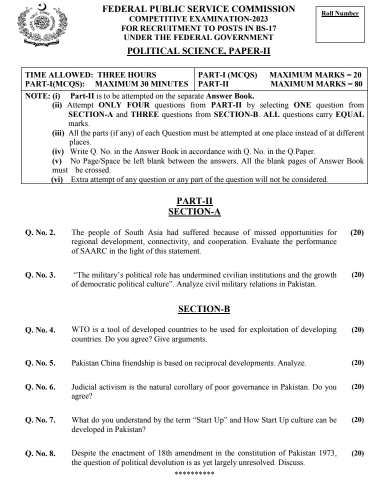Table of Contents
ToggleCSS Political Science Paper 2023-II
SECTION-A
Q. No. 2. The people of South Asia suffered because of missed opportunities for regional development, connectivity, and cooperation. Evaluate the performance of SAARC in the light of this statement (20 marks)
Q. No. 3. “The military’s political role has undermined civilian institutions and the growth of democratic political culture”. Analyze civil-military relations in Pakistan. (20 marks)
Section-B
Q. No. 4. WTO is a tool of developed countries to be used for the exploitation of developing countries. Do you agree? Give arguments. (20 marks)
Q. No. 5. Pakistan-China friendship is based on reciprocal developments. Analyze. (20 marks)
Q. No. 6. Judicial Activism is the natural corollary of poor governance in Pakistan. Do you agree? (20 marks)
Q. No. 7. What do you understand about the term “Start-up” and how can start-up culture be developed in Pakistan? (20 marks)
Q. No. 8. Despite the enactment of the 18th amendment in the constitution of Pakistan 1973, the question of political devolution is as yet largely unresolved. Discuss. (20 marks)
Summary:
SECTION-A
Q. No. 2. The people of South Asia suffered because of missed opportunities for regional development, connectivity, and cooperation. Evaluate the performance of SAARC in the light of this statement.
Summary: This question requires an evaluation of the South Asian Association for Regional Cooperation (SAARC) and its role in promoting regional development, connectivity, and cooperation in South Asia. Despite the potential for collaboration, SAARC has faced numerous challenges such as political tensions, especially between India and Pakistan, and lack of effective implementation of regional initiatives. The question asks to assess whether SAARC has failed to seize opportunities for economic and social development in the region and whether its performance aligns with the needs of South Asian countries in fostering connectivity and cooperation.
Q. No. 3. “The military’s political role has undermined civilian institutions and the growth of democratic political culture.” Analyze civil-military relations in Pakistan.
Summary: This question explores the impact of the military’s involvement in politics on Pakistan’s civilian institutions and democratic development. Pakistan has experienced several military coups, and the military has played a central role in the country’s governance, often sidelining civilian leaders and institutions. The question requires an analysis of how the military’s influence has affected democratic norms, institutions, and the political culture in Pakistan, and how it has hindered the development of a strong, stable democratic system.
SECTION-B
Q. No. 4. WTO is a tool of developed countries to be used for the exploitation of developing countries. Do you agree? Give arguments.
Summary: This question asks for a critical evaluation of the World Trade Organization (WTO) and whether it disproportionately benefits developed countries at the expense of developing nations. Critics argue that the WTO’s policies, including trade liberalization and intellectual property laws, favor wealthier countries by undermining the economic sovereignty of developing nations. The question calls for arguments either in support or against this view, considering the impact of WTO policies on global trade, economic inequalities, and the challenges faced by developing countries in accessing fair trade opportunities.
Q. No. 5. Pakistan-China friendship is based on reciprocal developments. Analyze.
Summary: This question explores the nature of the Pakistan-China relationship, emphasizing mutual benefits and reciprocal developments. The long-standing friendship between the two countries is often seen in terms of strategic, economic, and political cooperation. Key aspects include infrastructure projects like the China-Pakistan Economic Corridor (CPEC), trade agreements, and military cooperation. The question asks for an analysis of how this relationship benefits both countries and how reciprocal development has been achieved through their bilateral engagement.
Q. No. 6. Judicial Activism is the natural corollary of poor governance in Pakistan. Do you agree?
Summary: This question asks whether judicial activism in Pakistan is a response to ineffective or corrupt governance. Judicial activism occurs when courts take an active role in addressing issues that may be seen as outside their traditional jurisdiction, such as political and administrative matters. In Pakistan, the judiciary has often intervened in governmental affairs, particularly when it perceives that the executive or legislative branches are failing to uphold constitutional principles or deliver justice. The question invites an analysis of the relationship between poor governance and judicial activism, with examples from Pakistan’s political and legal history.
Q. No. 7. What do you understand about the term “Start-up” and how can start-up culture be developed in Pakistan?
Summary: This question explores the concept of “start-ups” and the potential for developing a start-up culture in Pakistan. A start-up is typically a new business venture that is designed to scale quickly, often through innovation or disruptive technology. The question requires an understanding of the key factors that support the creation and growth of start-ups, including access to funding, a supportive regulatory environment, and entrepreneurial education. It also asks for suggestions on how Pakistan can foster a vibrant start-up ecosystem, including policies, infrastructure, and institutional support.
Q. No. 8. Despite the enactment of the 18th amendment in the constitution of Pakistan 1973, the question of political devolution is as yet largely unresolved. Discuss.
Summary: This question asks for a discussion on the political devolution process in Pakistan, particularly in light of the 18th Amendment to the Constitution of 1973, which aimed to devolve political and administrative powers to the provinces. While the amendment transferred significant powers to the provinces, the process of devolution remains incomplete due to political resistance, administrative challenges, and uneven implementation. The question calls for an analysis of the obstacles to full political devolution in Pakistan and why the issue remains unresolved, despite constitutional changes.
